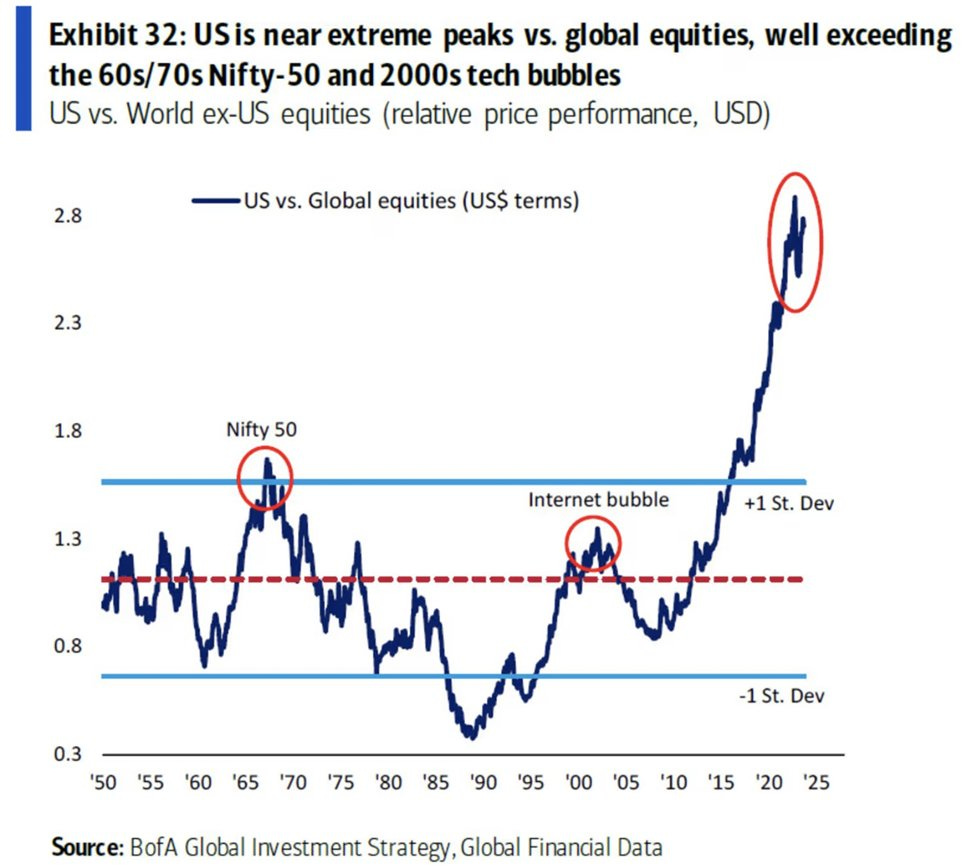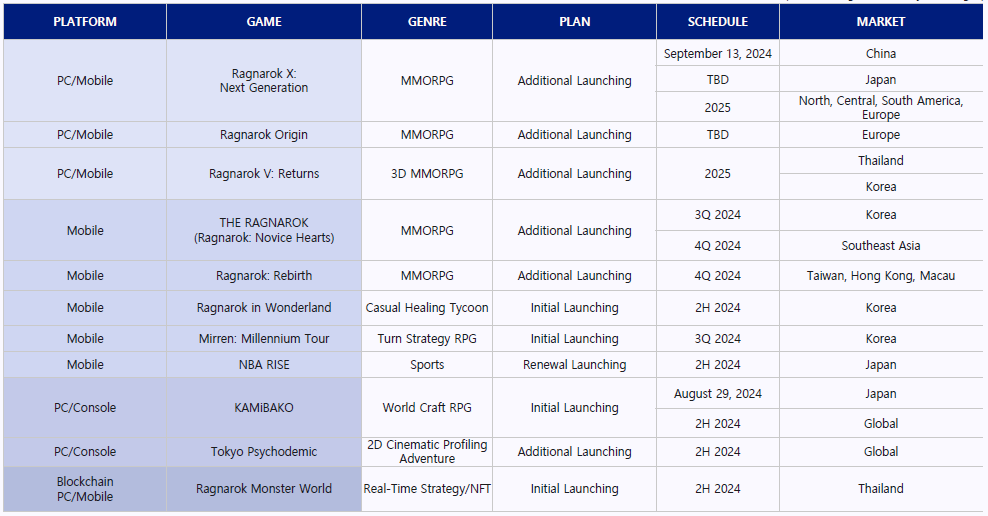How do you solve a problem like Korea? Gavity Co. $GRVY
It's more than Ragnarok
Of all the trends in the world today, one of the most confusing has been the strength of the US dollar despite the 6% - 7% fiscal deficit that our congress has been maintaining. For all of our concerns about debt service payments and unfunded liabilities, it hasn’t translated into a weakening currency, yet. Perhaps with the US access to cheap energy, the dollar will continue to stay strong for a while longer, but, I have recently been hearing more and more talking heads advocating for a dollar weakness, preferably gradual and sustained for several years. In their opinion, this is needed to provide a tailwind to the reshoring of domestic manufacturing and to support wages.
The consequence of a weakening dollar, if that is indeed in store for us, would be foreign investors repatriating their investments from the US to their home countries, or other countries which provide a more favorable risk return balance. In other words, a reversal of the US stock market outperformance over global markets since the Global Financial Crisis of 2008.
If I were to cherry pick a few jurisdictions where I would like to find undervalued companies in case this scenario unfolds, at the top of my list would be Argentina, Poland, Brazil, South Korea, and Japan. I believe that Poland and Brazil have mispriced political risk, the idea that Russia is going to invade Poland is likely a left wing scare tactic with no real basis in reality, and Brazil has an election in two years where Lula is likely too old to run for or win re-election. Argentina has the benefit of Milei’s market reforms, which are still likely being underestimated. And South Korea and Japan have the ability to do business with China despite US saber rattling, and are implementing pro stock market reforms. Their stocks are trading at cheap multiples due to their population collapse, but their companies derive most of their revenues internationally anyway.
It is a bit of a hassle to invest in foreign stocks, the transaction fees are typically higher, you might have to pay currency exchange spreads, and your brokerage account may not have that functionality by default. The alternative is to find US listed companies, but then the risk is that they are trading at US multiples rather than the much cheaper global multiples.
Thank you to
who brought this company to my attention, Gravity Co. (GRVY) is a South Korea based computer game designer which focuses on mobile games released into the Chinese and Southeast Asian markets. It is a level III ADR, the strictest level which allows GRVY to raise more capital on the US exchanges if needed, and has the highest requirement for disclosures and compliance.GRVY is trading at a market capitalization of $416 million, has no debt, and 465 billion Won in cash and cash equivalents, about $340 million. South Korea is also implementing a policy to boost the stock market where excess cash on the balance sheet will be taxed, but it isn’t certain if this will apply to companies as small as GRVY.
For 2023, revenue was $503 million and net income was $96 million. The sales and earning are lumpy, as released games don’t always become a hit, so true growth is hard to measure. Depending on whether you measure from peak to peak, trough to trough, etc. revenue growth is somewhere between 15% and 40%. Even at the most conservative 15% annual growth rate, $416 million market capitalization, and $360 million net cash with $96 million 2023 earnings is extremely cheap.
The 2023 price to earnings ratio of GRVY is a little over 4x. Their 59% owner, Japanese listed GungHo Online (3765.T) trades at a price to earnings ratio of over 13x, so it would appear GRVY does have some possibility of a multiple rerating on top of their growth prospects.
Speaking of growth prospects, Ragnarok Novice Heart Taiwan, Hong Kong, Macau was released on June 6th, Ragnarok Rebirth Southeast Asia was released on June 27th, Ragnarok Online China was released on June 28th, and Ragnarok Landverse Thailand was released on July 12th. Looking farther ahead, there are a continuous pipeline of projects for 2025 release for Europe and China based on GRVY’s Ragnarok intellectual property. It’s impossible to know if any individual title will be a hit, but my best guess would be lumpy growth.
With 59% of GRVY owned by GungHo, consider Gravity Co to be completely controlled by Kazuki Morishita, the president and CEO of GungHo since 2004. Kazuki Morishita has a long history as a video game developer, and he is credited with creating the billion dollar franchise Puzzle & Dragons.
Neither South Korea nor Japan are known for returning capital to shareholders. Stock market reforms are underway in both countries, but it is unclear what GRVY will eventually do with their cash pile, if anything. But the stock price of GRVY is down considerably in the last year, for reasons which I believe are temporary. The marketing spend of the imminent new releases caused profits for last quarter to be cut in half, meanwhile revenue was slightly up quarter over quarter. That marketing spend is to support the previously mentioned new launches, the revenue for which should be showing up shortly. The swing in profitability from the decreased marketing spend, combined with the possibility of a return to a growth trajectory should do wonders for the stock price.
Regarding the Intellectual Property of Gravity Co, Ragnarok Online was released in 2002, shortly after GRVY’s founding in 2001. Ragnarok titles have been rehashed and re-released continuously for the last 22 years. It’s hard to quantify that moat, intellectual property can lose value through neglect or poor product development, but so far, GRVY appears to be managing their Ragnarok property well. But GRVY is not solely reliant on their established property, a quick look at upcoming releases on Steam show that only two out of seven upcoming releases are relying on that franchise.
In summary, my best understanding of Gravity Co’s current situation is that advertising spending for several imminent new game releases caused last quarter’s profits to be cut in half. There are very good odds for increased profitability from a decline in marketing spending for new launches, and if any of the games are successful, revenues could be inflecting upward from here as well. I think the stock price is temporarily low due to this lumpiness, and the stock price has the opportunity to benefit from increased growth, profitability, and a multiple rerating. The share price currently sits at $59.98, down from the 2020 zero interest rate peak of $180 on a completely flat share count. And sales are significantly higher than in 2020. Even at these compressed multiples and trough earnings, the stock price has grown at 47% annually for the last 8 years. This could be a short term position for the catalysts, or it has the potential to be a long term quality compounder as well.









if south korean companies are going to be punished for holding cash, what do you think of investing in those companies with a lot of cash? some of these are carrying a startling amount of cash.
here's a list, courtesy of chatgpt:
1. Samsung Electronics
Total Cash Holdings (2023): Around $100 billion.
Shares Outstanding (2023): Approximately 6.8 billion shares.
Estimated Cash Per Share:
≈ $14.70 per share
2. SK Hynix
Total Cash Holdings (2023): Around $12 billion.
Shares Outstanding (2023): Approximately 728 million shares.
Estimated Cash Per Share:
≈ $16.48 per share
3. Hyundai Motor Company
Total Cash Holdings (2023): Around $15 billion.
Shares Outstanding (2023): Approximately 213 million shares.
Estimated Cash Per Share:
≈ $70.42 per share
4. LG Electronics
Total Cash Holdings (2023): Around $5.5 billion.
Shares Outstanding (2023): Approximately 160 million shares.
Estimated Cash Per Share:
≈$34.38 per share
5. Naver Corp
Total Cash Holdings (2023): Around $4.5 billion.
Shares Outstanding (2023): Approximately 164 million shares.
Estimated Cash Per Share:
≈$27.44 per share
6. Kakao Corp
Total Cash Holdings (2023): Around $3 billion.
Shares Outstanding (2023): Approximately 442 million shares.
Estimated Cash Per Share:
≈ $6.79 per share
7. Posco Holdings
Total Cash Holdings (2023): Around $10 billion.
Shares Outstanding (2023): Approximately 87 million shares.
Estimated Cash Per Share:
≈ $114.94 per share
Notes:
The total cash holdings include cash, cash equivalents, and short-term investments as reported by these companies.
The values provided here are rough estimates based on recent financial data. For exact figures, a company’s most recent financial filings or annual reports should be referenced, as these provide official numbers.
Well, guess I’ll wait for a pullback.